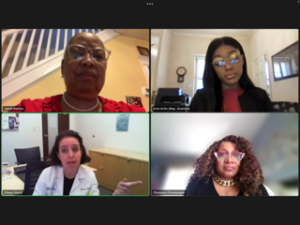
Champions Janet Dennis and Florence Champagne and Dr. Eileen Hsich meet with Rep. Mary Gay Scanlon’s aide
While they may not have been able to traverse of the halls of Congress in person, WomenHeart Champions, Board and Scientific Advisory Council members nonetheless brought their voices to Washington. Throughout the day on March 2, nearly 40 advocates held approximately 70 meetings on Zoom with lawmakers and their staff to tell their stories and to advocate for women living with and at risk of heart disease.
Participants in WomenHeart’s virtual advocacy day asked Congress for two things: to support more research on heart disease in women – specifically to provide robust funding for the National Heart, Lung and Blood Institute (NHLBI) within the National Institutes of Health (NIH) – and to support the CAROL Act.
In sharing their experiences with heart disease – including the challenges they faced getting an accurate and timely diagnosis or accessing treatment that was backed up by research on women, as well as other details of their heart stories – these WomenHeart Champion advocates demonstrated why more research on heart disease in woman would improve female patients’ experiences and outcomes. Congressional staffers listened intently and were often moved by the stories they heard, expressing support for the policy asks.
At the time of the meetings, Congress was five months behind in passing a funding bill for Fiscal Year (FY) 2022 needed to finance several agencies within the federal government, including all health funding. Advocates made clear how important it is for agencies like NIH to receive funding in a timely manner – so they can plan their research for the year – and why heart disease in women is an important area of research. Fortunately, Congress has since passed funding legislation and President Biden signed it this week, on March 15. It provides an increase in NIH and NHLBI funding, though slightly below what our advocates were asking for. They also asked for timely passage of FY 2023 funding bills – due to be passed by September 30, 2022 – that include robust funding for medical research.
The Cardiovascular Advances in Research and Opportunities Legacy (CAROL) Act would invest in research to address gaps in our understanding of heart valve disease, including what causes sudden cardiac arrest in a small number of people, predominantly women. The bill also invests in education efforts to broaden awareness of the risk factors and symptoms of heart valve disease and in efforts to increase screening, detection and diagnosis of heart valve disease, something that is especially important for women in underserved communities.
The CAROL Act, named after Congressman Andy Barr’s (R-KY) wife who had mitral valve prolapse and died of sudden cardiac arrest at age 39, passed in the House in December 2021. Our advocates thanked House members for their support and asked Senators to pass the legislation. WomenHeart continues to work to advance the bill in the Senate, and you can help by emailing your Senators today and asking them to cosponsor the CAROL Act.
Overall, it was an empowering day for all participants. Many were thankful for the opportunity to make a difference and to speak up for something they are passionate about. WomenHeart is hopeful we can host an advocacy day like this again next year – in person in Washington, DC.




